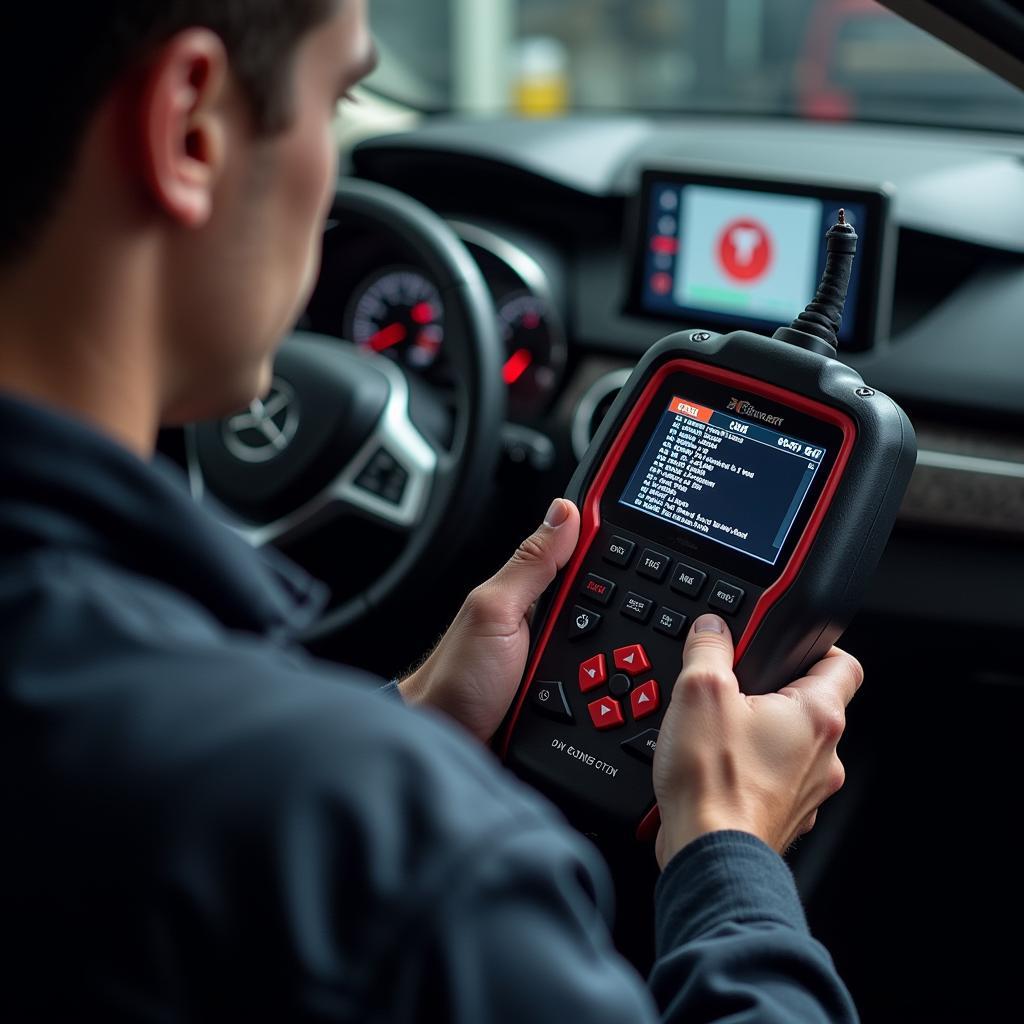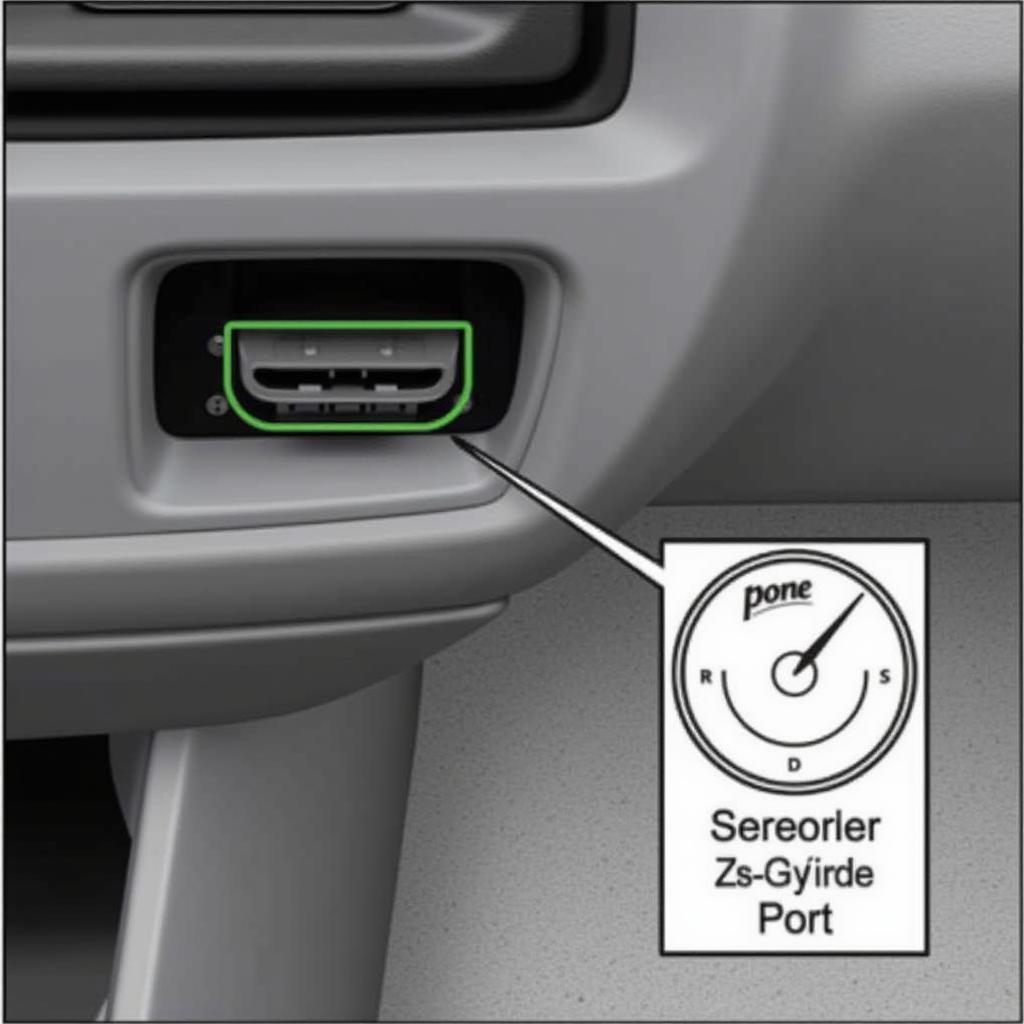In today’s digital age, vehicles are becoming increasingly complex, relying heavily on intricate electronic systems. When your car throws a temperamental fit, deciphering those cryptic dashboard warning lights can feel like trying to crack the Enigma code. That’s where the magic of an auto diagnostic scanner, often referred to as a car scan tool, comes into play.
 Mechanic using a diagnostic scanner on a car
Mechanic using a diagnostic scanner on a car
Why You Need a Car Diagnostic Scanner
Gone are the days of relying solely on a mechanic’s intuition and a trusty wrench. A car diagnostic scanner is your window into your car’s brain, allowing you to:
- Read and understand those pesky check engine lights: Decipher Diagnostic Trouble Codes (DTCs) to pinpoint the root cause of a problem.
- Monitor live data streams: Keep tabs on engine performance, fuel efficiency, and other vital parameters in real time.
- Perform advanced functions: Depending on the scanner, you can bleed brakes, reprogram TPMS sensors, and even conduct ECU coding.
Types of Auto Diagnostic Scanners
Navigating the world of car scan tools can feel like entering a labyrinth. Here’s a breakdown to help you choose the best auto diagnostic scanner for your needs:
1. OBD-II Code Readers
These pocket-friendly devices are the entry-level contenders, perfect for reading and clearing basic DTCs. They’re budget-friendly but may not offer live data or advanced functions.
2. Bluetooth Scanners
These connect to your smartphone or tablet, offering a user-friendly interface and often providing access to more features like live data and manufacturer-specific codes.
3. Professional-Grade Scanners
These are the heavy hitters, favored by mechanics and serious DIY enthusiasts. Expect comprehensive diagnostics, advanced functions, and the ability to access manufacturer-specific systems.
Key Features to Consider
Choosing the best car scan tool is about finding the right fit for your needs. Keep these key features in mind:
- Vehicle Coverage: Ensure the scanner supports your car’s make, model, and year.
- DTC Library: Look for a scanner with a comprehensive database to decode those cryptic codes.
- Live Data Streaming: This feature allows you to monitor real-time sensor data for advanced troubleshooting.
- Bi-Directional Controls: These allow you to perform actions like actuating solenoids or running tests, invaluable for in-depth diagnostics.
- Software Updates: Regular updates are crucial to ensure compatibility with newer vehicles and features.
OBD1 Diagnostic Scan Tool Near Me
The Benefits of Owning a Car Diagnostic Scanner
Investing in the best auto diagnostic scanner can pay off in spades:
- Save Money: Avoid unnecessary trips to the mechanic for simple diagnostics.
- Early Detection: Identify potential issues early on, preventing costly repairs down the line.
- Empowerment: Take control of your vehicle’s maintenance and repair, knowing you have the tools to understand what’s happening under the hood.
Car Diagnostic Tool Suppliers UK
Tips for Choosing the Best Auto Diagnostic Scanner
Finding the best car scan tool for you can be daunting. Here are a few expert tips:
John Smith, Senior Automotive Technician at CARW Workshop, advises, “Consider your skill level and how you plan to use the scanner. A simple code reader might suffice for basic diagnostics, but serious DIYers or professionals will benefit from a more advanced model with bi-directional controls and manufacturer-specific coverage.”
BMW E83 Diagnostic Tool
Conclusion
Choosing the Best Auto Diagnostic Scanner And Car Scan Tool empowers you to take charge of your vehicle’s health. From deciphering cryptic warning lights to monitoring live data, the right scanner can save you time, money, and headaches in the long run.
Need help choosing the perfect car diagnostic scanner? Contact CARW Workshop today at +1 (641) 206-8880 or visit our office at 4 Villa Wy, Shoshoni, Wyoming, United States. Our team of experts is here to guide you.
FAQs
1. Can I use any scanner on my car?
Not necessarily. Scanners need to be compatible with your car’s make, model, and year.
2. What is an OBD-II port?
It’s a standardized diagnostic port found in most vehicles manufactured after 1996, allowing scanners to communicate with your car’s computer.
 Location of the OBD-II port in a car
Location of the OBD-II port in a car
3. Are car diagnostic scanners difficult to use?
Many scanners come with user-friendly interfaces, but some advanced features might require some technical knowledge.
4. Can a scanner fix my car?
While a scanner can identify problems, it won’t fix them. You’ll need to address the underlying issue based on the diagnostic information.
5. Do I need to buy a new scanner every time I get a new car?
Not necessarily. Many scanners offer software updates to support newer vehicles. Look for a scanner with good update support.








One Response